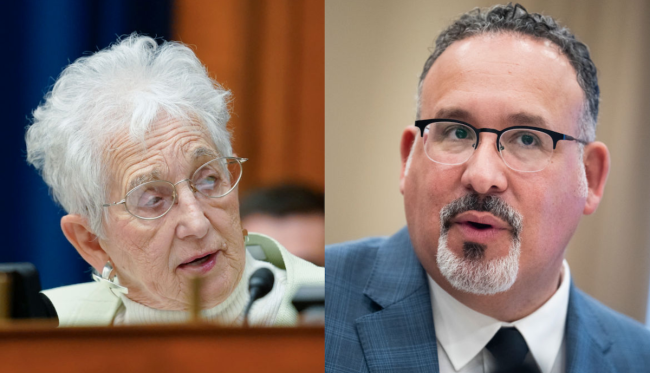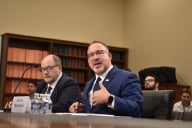You have /5 articles left.
Sign up for a free account or log in.

Representative Virginia Foxx (R-N.C.) and Education Secretary Miguel Cardona, shown here in earlier hearings, clashed Tuesday at a nearly five-hour hearing of the House Education and the Workforce Committee.
Pool/Getty Images (left); Tom Williams/CQ-Roll Call Inc. via Getty Images (right)
House Republicans’ frustrations with the Biden administration’s education policies and embrace of the culture wars over education were on full display Tuesday when Education Secretary Miguel Cardona testified before the House Education and the Workforce Committee.
“What color is your suit?” asked Michigan representative Lisa McClain, a Republican, during a heated exchange. “I’m just trying to figure out if we can answer a question.”
The nearly five-hour hearing, which became contentious at times, featured questions, talking points and discussion about a wide range of higher education–related topics from the administration’s budget proposal to the influence of the Chinese government on American universities to student loan policies.
This was Cardona’s first appearance before the committee since Republicans took over the House.
Cardona repeatedly defended his department’s work to improve the student loan system and help students recover from the pandemic, among other issues, echoing his press statements and comments at recent budget committee meetings. He also tried to steer clear of debates about culture war topics.
“The choice we face now is whether we’re going to build on the common ground that we have to invest in our children or protect the broken status quo that’s failed too many of our schools,” Cardona said in his opening remarks. “Now is not the time to break down in partisan or divisive culture wars.”
North Carolina representative Virginia Foxx, the Republican who chairs the committee, outlined a series of concerns about the department’s actions under President Biden in her opening remarks.
“Mr. Secretary, I wish this hearing was an endorsement of your department’s cooperation with our requests, so we could then proceed in good faith to the FY 2024 budget request,” she said. “Instead, your department has engaged in disingenuous and misleading actions while being minimally responsive to congressional oversight.”
Virginia representative Bobby Scott, the committee’s ranking Democrat, and other Democrats used their time to show support for student loan forgiveness and other policies as well as to detail how the budget cuts proposed in the House debt-ceiling bill would affect the department and students.
Scott credited Cardona with helping to restore the department’s commitment to supporting students and educators.
“These investments would be transformational for our education system,” Scott said of the department’s budget proposal. “Regrettably, my Republican colleagues have chosen to use their time in the majority to pursue policies that harm students and roll back the clock on our progress.”
Oversight
Foxx and other committee members voiced frustration repeatedly over the department’s pace in responding to oversight and data requests.
Foxx said the department has largely ignored requests for documents and not yet responded to some of the committee’s 11 oversight letters. When the agency did respond, she said the responses were minimal and nearly all were late.
“We will continue to press for the answers to the questions that we’re asking and the information that we’ll need,” she said.
Near the end of the hearing, after Foxx asked for a clear commitment to respond to the oversight letters, Cardona said the department will “respond to letters and provide the information we can provide to you in good faith.”
As the hearing progressed, Republicans increasingly criticized Cardona for what they said was dodging their questions as they grew more annoyed with the secretary’s answers.
“I’ve been listening to you evade yes-or-no questions all day,” said Representative Kevin Kiley, a California Republican.
Cardona defended his department’s work in responding to oversight and Freedom of Information Act requests.
“We provided over 2,400 pages of documents in this Congress alone,” Cardona said. “We’ve responded to 45 letters this Congress alone. We’re going to continue to take that very seriously.”
Student Loans
Foxx questioned Cardona on whether the department was prepared to restart student loan payments and whether he would commit to no further extensions of the payment pause. Foxx asked the department last month for more details on its plan.
“After the Supreme Court decision is made, we plan to start payments within 60 days,” he said, reiterating a commitment he made at a Senate budget hearing last week.
Democrats on the committee said they were concerned about the impact of resuming payments after a three-year pause and asked if the agency had the resources to pull off the operation.
“We’re geared up and ready to go,” Cardona said.
However, if the administration’s budget proposal is not supported, that would significantly impact the department’s ability to serve borrowers, he said.
“We look forward to making sure that you have the resources that you need,” Minnesota representative Ilhan Omar, a Democrat, said.
Throughout the hearing, Cardona repeatedly defended the department’s student loan policies, including proposed reforms to the income-driven repayment program, which offers borrowers more generous terms to help them pay back their loans.
“Income-driven repayment is going to open access to college for many more students,” Cardona said. “The goal is for them to pay their debt based on their income. As their income increases, their debt payment increases. I’ve seen too many students—intelligent students, students who have tremendous potential—rule out college because of fear of the cost … Imagine the talent in this country that’s going untapped.”
Not all committee members liked Cardona’s explanations.
“You are implying that if you didn’t go to college, your ability is untapped,” Wisconsin representative Glenn Grothman, a Republican, said. “I think that’s a little bit snobby.”
Cardona replied that some of his best and most influential teachers never went to college.
Other Issues
Kentucky representative James Comer, the top Republican on the House Oversight Committee, asked for more information about the department’s enforcement of Section 117 of the Higher Education Act of 1965, which requires colleges and universities to, twice a year, disclose all foreign gifts and contracts totaling $250,000 or more. Comer and others said they were concerned about the influence of the Chinese government on American universities and worried that the department was backtracking on efforts to require colleges to report the foreign gifts and contracts.
Cardona said the administration is improving the system for reporting and on track to make more filings public.
“We’ve got a problem with our universities,” Comer said. “According to multiple university presidents I’ve spoken with, we have Chinese students that are stealing our intellectual property. They are essentially serving as spies for the Chinese Communist Party. We have certain universities that are receiving enormous anonymous gifts from the Chinese government. This is a concern for the House Oversight Committee.”
Republicans also repeatedly criticized the proposed rule amending the Title IX of the Education Amendments of 1972 regulations to prohibit blanket bans on transgender students participating in sports teams consistent with their gender identity.
“We should be focusing on what the American people are asking us for,” Cardona said. “They are not asking for divisive comments. They are asking us to work together. Student safety is a primary one. Making sure that students are accepted in schools and acknowledged for who they are is critically important.”
Some Democrats on the committee asked Cardona for more information about the department’s plans to oversee the online program managers—the outside companies that colleges and universities contract with to run their online offerings. Several committee members have criticized the outside companies and want the department to do more to hold them accountable.
Cardona said that there’s an increased demand for flexibility in higher education, but the department wants to ensure greater oversight as well.
“So that it doesn’t result in what we’ve experienced with borrower defense and having almost $14 billion in loans discharged because students were taken advantage of by certain online, predatory practices,” he said.
Florida representative Aaron Bean, a Republican, said that proprietary schools are under attack by the department and asked Cardona, “Why are you at war with proprietary colleges?”
“I don’t think we’re at war,” Cardona said. “We’re fixing a broken system.”








